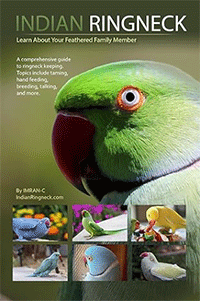Hello Leanne,
Welcome to this board! Excuse my late response, as usual, very busy.

While reading your post, you mentioned that your Indian Ringneck is a female and is approximately three years of age. This implies that your Ringneck is in fact sexually mature. Female Ringnecks reach sexual maturity at about one to two years of age; in fact, some breeders start as early as a year.
Indian Ringneck parrots are considered moderately mild tempered parrots; however, breeding season can revert that trait upside down. During breeding season, females and males will pin their eyes, make unheard noises, display their tail feathers and wings, and become territorial. This is common and should be expected-- mainly in males. Females usually become aggressive and are more prone to biting. The biting is not caused out of anger or fear, but powerful hormones that are released during the breeding season.
You might be wondering how you can stop this lunging and biting towards family members. You can’t; quite simply you need to wait it out. This seasonal uproar of surging hormones will soon become a ritual and you’ll soon begin to expect them yearly. There is no time frame to when the bird will stop nipping and biting family members. Just inform them that she is in “heat” at the moment and it will pass shortly. Family members, mainly ones that your female shows aggression towards, should avoid any physical contact with her. I’m sure they will because who wants to get bitten?

You also mentioned that Zoe is not showing aggression towards you. She might see you as her partner. This is common and she might bite you if you go towards a member of the family in which she does not approve. She will bite you in hopes that you’ll back away from the “intruder.” To prevent any bites I highly recommend holding the bird when its quiet or you’re alone. The only answer to explain this behavior is that Ringnecks in the wild break away from their flocks to nest independently, very rarely will they interact with flock members. That’s why you see very little colony breeding, if any, with Ringnecks because of aggression.
Breeding Indian Ringnecks that were once tamed, mainly through hand feeding, might cause the pair to lose several generations of offspring though starving. It’s assumed that because parrots are syringe fed, they do not know how to feed their chicks. Breeders who spoon feed argue that spoon-feeding is a more natural way and if the birds ever decide to breed, they’ll know how to feed their chicks. So, if you ever are confronted with breeding your female you might have to hand feed or spoon the chicks. Also, if your female Ringnecks has been a pet for a long period of time more than likely they were not given the change to lay eggs. This can cause the bird to become egg bound, which will need medial attention.

Hope this helps and if you have anymore questions please feel free to ask.
Best wishes,

I.C.
